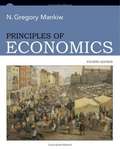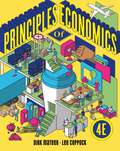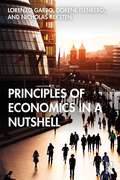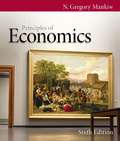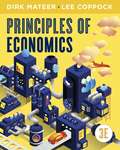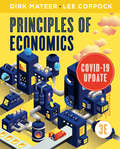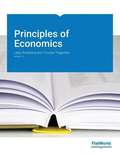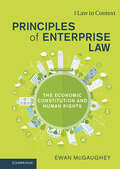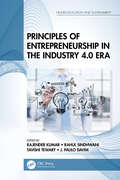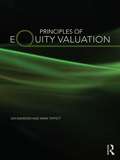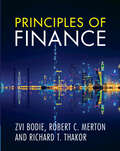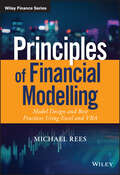- Table View
- List View
Principles of Economics (Fourth Edition)
by N. Gregory MankiwPRINCIPLES OF ECONOMICS continues to be the most popular and widely used text in the Economics classroom. The 4th edition features a strong revision of content in all 36 chapters while maintaining the clear and accessible writing style that is the hallmark of the highly respected author. The 4th edition also features an expanded instructor's resource package designed to assist instructors in course planning and classroom presentation and full integration of content with Aplia, the leading online Economics education program. In the 4th edition Greg Mankiw has created a full educational program for students and instructors -- Experience Mankiw 4e. "I have tried to put myself in the position of someone seeing economics for the first time. My goal is to emphasize the material that students should and do find interesting about the study of the economy. " - N. Gregory Mankiw.
Principles of Economics (Fourth Edition)
by Dirk Mateer Lee CoppockMateer and Coppock Make Economics for Everyone Drawing on their extensive teaching experience in the classroom and online, Mateer and Coppock continuously innovate to address the changing teaching and learning challenges faced by instructors and students. The Fourth Edition introduces new scaffolded learning pedagogy with a Norton Illumine Ebook as well as revised InQuizitive and Smartwork activities that provide personalized support and build problem-solving skills. New relevant and relatable examples ensure that students understand how their lives are influenced by economics, and rich Norton Teaching Tools resources help instructors connect with students before, during, and after class. This purchase offers access to the digital ebook only.
Principles of Economics in a Nutshell
by Lorenzo Garbo Dorene Isenberg Nicholas RekstenPrinciples of Economics in a Nutshell provides a succinct overview of contemporary economic theory. This key text introduces economics as a social science, presenting the discipline as an evolving field shaped within historical context rather than a fixed set of ideas. Chapters on microeconomics introduce concepts of scarcity and tradeoffs, market analysis (the Marshallian cross of supply and demand) and the theory of the firm and market structure. Chapters on macroeconomics begin with an explanation of national income accounting, followed by discussions of macroeconomic theory in the goods market and in the money market from both a Keynesian and Classical view. The text concludes with examples of how to expand upon core material, introducing the perspectives of feminist and ecological economics. This book will be of great importance to students new to economics and is ideal for use on single-semester Principles courses or as a primer on economics courses in other settings. The text is fully supported by online resources, which include a set of analytical questions and suggestions for further reading for each chapter.
Principles of Economics in Context
by Neva Goodwin Jonathan M. Harris Julie A. Nelson Brian Roach Mariano TorrasPrinciples of Economics in Context lays out the principles of micro- and macroeconomics in a manner that is thorough, up to date, and relevant to students, attuned to the economic realities of the world around them. It offers engaging treatment of important current topics such as new thinking in behavioral economics, financial instability and market bubbles, debt and deficits, and policy responses to the problems of unemployment, inequality, and environmental sustainability. This new, affordable edition combines the just-released new editions of Microeconomics in Context and Macroeconomics in Context to provide an integrated full-year text covering all aspects of both micro and macro analysis and application, with many up-to-date examples and extensive supporting web resources for instructors and students.Key features include:An eye-opening statistical portrait of the United States; Clear explanation of basic concepts and analytical tools, with advanced models presented in optional chapter appendices; Presentation of policy issues in historical, institutional, social, political, and ethical context--an approach that fosters critical evaluation of the standard microeconomic models, such as welfare analysis, labor markets, and market competition; Issues of human well-being, both domestic and global, are given central importance, enriching the topics and analytical tools to which students are introduced; The theme of sustainability--financial, social, and ecological--is thoroughly integrated in the book, with chapters on alternatives to standard GDP measurement, the environment, common property, public goods, and growth and sustainability in the twenty-first century; Full complement of instructor and student support materials online, including test banks and grading through Canvas.
Principles of Economics Sixth Edition
by Robert Frank Ben S. Bernanke Kate Antonovics Ori HeffetzAuthors Bob Frank, Ben Bernanke, and introducing Kate Antonovics from the University of California San Diego and Ori Heffetz from Cornell University, present a coherent short list of core principles in introductory economics and reinforce them by illustrating and applying each in numerous contexts. With engaging questions, explanations and exercises, the authors help students relate economic principles to a host of everyday experiences such as going to the ATM or purchasing airline tickets. Throughout this process, the authors encourage students to become "economic naturalists:" people who employ basic economic principles to understand and explain what they observe in the world around them.
Principles of Economics, Sixth Edition
by N. Gregory MankiwWith its clear and engaging writing style, Principles of Economics (Sixth Edition) continues to be one of the most popular books on economics available today. Mankiw emphasizes material that you are likely to find interesting about the economy (particularly if you are studying economics for the first time), including real-life scenarios, useful facts, and the many ways economic concepts play a role in the decisions you make every day.
Principles of Economics (Third Edition)
by Dirk Mateer Lee CoppockRelatable economics is memorable economics Widely praised by adopters as the most relatable textbook available, Mateer and Coppock’s Third Edition of Principles of Economics develops students’ problem-solving skills with step-by step explanations and familiar applications and examples. Principles of Economics makes economics memorable for an exam and a lifetime. This purchase offers access to the digital ebook only.
Principles of Economics (Third Edition): Covid-19 Update
by Dirk Mateer Lee CoppockHelping you explain a different world Students and instructors are living through a pandemic that has changed how and what they teach, and how and where they learn. The COVID-19 Update of Principles of Economics, Third Edition, provides the information that students need to make sense of the impacts COVID-19 has had on the economy. The Update Edition has been completely revised to include new examples, new data, new policies, and more. All of Norton’s digital resources fully integrate with most learning management systems, providing the flexibility instructors need in this changed world. This purchase offers access to the digital ebook only.
Principles of Economics v 1.1
by Libby Rittenberg Timothy TregarthenVersion 1.1 boasts improved coverage throughout the text including significant updates to: Chapters 20 (GDP, Price Level Changes, Business Cycles, and Unemployment) Chapter 21 (Measuring Total Output and Income) Chapter 27 (Government and Fiscal Policy) Chapter 32 (Macroeconomics for the 21st Century).
Principles of Economics Version 2.0
by Libby Rittenberg Timothy TregarthenIn the macro chapters of Version 2.0 of Principles of Economics thoroughly incorporates the recent recession and recovery-- placing it in historical and theoretical context and not shying away from the controversies surrounding how government responded to it. In the micro chapters, all the time-sensitive data has been updated, along with over half of all the "Start Ups" and "Case and Point" applications being brand new or updated. Flat World Knowledge is thrilled to publish a re-launch of Tim Tregarthen's acclaimed Principles of Economics V. 2.0 book, and proud to bring Tim's remarkable talents as a teacher to future generations of students.
Principles of Effective Persuasion
by Herminia IbarraSummarizes six principles of effective persuasion. A rewritten version of an earlier note.
Principles of Engineering Management
by Jishan HeThis book presents a comprehensive overview of engineering management, giving readers a complete picture of this research field. Following an introduction, the book explores: • Engineering Management Ontology • Engineering Management Epistemology • Engineering Management Methodology • Engineering Management Decision Theory • Engineering Management Organization Theory • Engineering Management Value Theory • Engineering Management Innovation Theory • Engineering Management Environment Theory • Engineering Management Humanities • Engineering Management Ethics Theory The book includes case studies that demonstrate how various concepts can be practically applied to resolve real-world problems. The book is a valuable read for professionals of engineering management, management and systems engineering.
Principles of Enterprise Law: The Economic Constitution and Human Rights (Law in Context)
by Ewan McGaugheyMajor enterprises shape our lives in countless ways: big tech and 'surveillance media' that affect democratic debate, algorithms that influence online shopping, transport to work and home, energy and agriculture corporations that drive climate damage, and public services that provide our education, health, water, and housing. The twentieth century experienced swings between private and public ownership, between capitalism and socialism, without any settled, principled outcome, and without settling major questions of how enterprises should be financed, governed and the rights we have in them. This book's main question is 'are there principles of enterprise law', and, if they are missing, 'what principles of enterprise law should there be'? Principles of Enterprise Law gives a functional account of the 'general' enterprise laws of companies, investment, labour, competition and insolvency, before moving into specific enterprises, from universities to the military. It is an original guide to our economic constitution and human rights.
Principles of Entrepreneurship in the Industry 4.0 Era (Higher Education and Sustainability)
by Rajender Kumar Rahul Sindhwani Tavishi Tewary J. Paulo DavimThe feature that distinguishes this book from all other books on entrepreneurship is the comprehensive discussion of the challenges and opportunities that entrepreneurs encounter in the Industry 4.0 era. It enables readers to start dreaming big, visualizing, and encourages them to think clearly and creatively. The book emphasizes creativity and innovation as the core of entrepreneurship, by stretching imagination, thinking about problems and solutions, and visualizing their ventures at the local, national, and global scale. It also discusses the role of women in private enterprise, and entrepreneurship in the post COVID-19 world.
Principles of Environmental Economics and Sustainability: An Integrated Economic and Ecological Approach
by Ahmed HussenRecent years have witnessed considerable consolidation between the disciplines of environmental and ecological economics at research level, but until now textbooks in the area have done little to reflect this. Ahmed Hussen’s book is to date the only one to reconcile the two standpoints. The central focus of the book will continue to be on this systematic integration of both mainstream and ecological approaches to environmental economics, and an acknowledgement that enduring solutions to major contemporary environmental challenges can be obtained through studies based on a well-conceived and balanced interdisciplinary approach. However, this third edition also contains much that is new. Chiefly, brand new chapters appear covering the following topics: The economics of climate change The economics of biodiversity and ecosystem services ‘Green’ accounting and alternative economic and social indicators of sustainability The business case for environmental sustainability An Appendix that provides a brief historical account of the development of ecological economics The result is a comprehensive introduction to the main facets of environmental and ecological economics — a text that boldly refuses to put up barriers between disciplines and takes a holistic approach to vital issues. This student-friendly textbook contains a variety of study tools including learning points, boxed features, case studies, revision questions and discussion questions, and an Appendix that provides students with a review of basic economic principles relevant to the study of the environment and its management. Written in a clear and accessible style, this book will prove an excellent choice for introducing both students and academics to the world of environmental economics.
Principles of Environmental Economics and Sustainability: An Integrated Economic and Ecological Approach
by Ahmed HussenPrinciples of Environmental Economics and Sustainability was the first textbook to make a serious attempt to systematically integrate ecological and economic principles. It successfully introduced ecological perspectives to the study of environmental economics while maintaining the integrity of the standard economic approach. In this new edition this notion continues to be embraced while also offering readers several further features, including greater in-depth coverage of the economics of climate change, expanded reference sections, and an updated and expanded "review and discussion questions" section. The unique integration of both mainstream and ecological approaches which this textbook provides proves particularly illuminating in relation to the following topics: economics of climate change environmental valuation cost–benefit analysis and the environment sustainability in theory and practice limits to growth the role of technology the business case for environmental sustainability. Written in a clear and accessible way, this key textbook is an excellent resource for all students of environmental economics. With study tools including learning objectives, case studies, and charts and graphs, this volume uses real-world examples to engage both students and academics within the field.
Principles of Equity and Trusts
by Alastair HudsonPrinciples of Equity and Trusts is a concise new textbook from Alastair Hudson - the author of the definitive classic, Equity and Trusts. Through clear and careful analysis, the author explains what the law is, its foundational principles, and its social and economic effect. By beginning with the core principles on which this field is based, even the most complex academic debates concerning express, resulting and constructive trusts, the family home, charities law and other equitable doctrines become comprehensible and interesting. This book offers a fresh, lively and often humorous account of Equity and Trusts. Through easy-to-follow worked examples and analysis of the case law, Alastair helps you to answer problem questions and to prepare coursework. The author shows how the law affects real people in real situations. Each chapter begins with a clear and concise introduction to the core principles. It contains numbered headings for ease of navigation and advice on studying this subject. Students also have access to Professor Hudson's ever-popular supporting website which has had hundreds of thousands of hits over the years. It has over 50 brief podcasts on key issues which have been specially re-recorded to coincide with the publication of this book. That website also contains detailed lectures, a variety of videos explaining the law and guidance on tackling assessments. Characterised by the passion and enthusiasm for his subject matter that make Alastair Hudson's classic textbook so popular, Principles of Equity and Trusts is sure to be a winner with both academics and students alike.
Principles of Equity and Trusts
by Alastair HudsonThis is the second edition of Principles of Equity and Trusts , the concise new textbook from Alastair Hudson – the author of the definitive classic, Equity and Trusts. Through clear and careful analysis, the author explains what the law is, its foundational principles, and its social and economic effect. By beginning with the core principles on which this field is based, even the most complex academic debates concerning express, resulting and constructive trusts, the family home, charities law and other equitable doctrines become comprehensible and interesting. This book offers a fresh, lively and often humorous account of Equity and Trusts. Through easy-to-follow worked examples and analysis of the case law, Alastair helps you to answer problem questions and to prepare coursework. The author shows how the law affects real people in real situations. Each chapter begins with a clear and concise introduction to the core principles. It contains numbered headings for ease of navigation and advice on studying this subject. Students also have access to Professor Hudson’s ever-popular supporting website, which has had hundreds of thousands of hits over the years. It has over 50 brief podcasts on key issues which have been specially re-recorded to coincide with the publication of this book. That website also contains detailed lectures, a variety of videos explaining the law and guidance on tackling assessments. Characterised by the passion and enthusiasm for his subject matter that make Alastair Hudson’s classic textbook so popular, Principles of Equity and Trusts is sure to be a winner with both academics and students alike.
Principles of Equity Valuation
by Ian Davidson Mark TippettThe book provides a rigorous introduction to corporate finance and the valuation of equity. The first half of the book covers much of the received theory in these areas such as the relationship between the risk of an equity security and the return one can expect from it, the effects of leverage (that is, the borrowing policies of the firm) on the return one can expect from the firm’s shares and the role that dividends, operating cash flows and accounting earnings play in the valuation of equity. The second half of the book is more advanced and deals with the important role that "real options" (that is, as yet unexploited investment opportunities) play in the valuation of equity.
Principles of Finance
by Zvi Bodie Robert C. Merton Richard T. ThakorWritten for the MBA or undergraduate first course in finance, as well as follow-on courses, this textbook provides a clear, accessible, and thorough explanation of the principles of finance; how they connect to real-world practice and how they are used to solve problems. Structured around ten unifying principles representing the core tenets of the science, this book imparts basic financial concepts irrespective of the institutional framework, ensuring that students learn about finance in a way that is applicable both now and into the future. Pedagogical features include learning objectives and major takeaways, applications in the world of business, numerous worked examples, key equation boxes highlighting the most important financial equations, quick check questions with solutions, key finance terms with a detailed glossary, and more than 380 homework problems. Online resources include a solutions manual, detailed instructor manual to adapt the book to your course, lectures slides and a 800 question text bank for instructors.
Principles of Financial Accounting
by John Wild Ken ShawPrinciples of Financial Accounting responds to the market’s request for a financial accounting text with a sole-proprietorship approach. Chapter opening vignettes using dynamic entrepreneurs appeal to all students and show the relevance of accounting. Students are encouraged to think like a businessperson and apply what they learn. A wide variety of assignments provide instructors with materials to teach, assess, and challenge students on several levels.
Principles of Financial Economics
by Stephen F. LeroyFinancial economics, and the calculations of time and uncertainty derived from it, are playing an increasingly important role in non-finance areas, such as monetary and environmental economics. In this 2001 book, Professors Le Roy and Werner supply a rigorous yet accessible graduate-level introduction to this subfield of microeconomic theory and general equilibrium theory. Since students often find the link between financial economics and equilibrium theory hard to grasp, they devote less attention to purely financial topics such as calculation of derivatives, while aiming to make the connection explicit and clear in each stage of the exposition. Emphasis is placed on detailed study of two-date models, because almost all of the key ideas in financial economics can be developed in the two-date setting. In addition to rigorous analysis, substantial sections of discussion and examples are included to make the ideas readily understandable.
Principles of Financial Modelling: Model Design and Best Practices Using Excel and VBA (The Wiley Finance Series)
by Michael ReesThe comprehensive, broadly-applicable, real-world guide to financial modelling Principles of Financial Modelling – Model Design and Best Practices Using Excel and VBAcovers the full spectrum of financial modelling tools and techniques in order to provide practical skills that are grounded in real-world applications. Based on rigorously-tested materials created for consulting projects and for training courses, this book demonstrates how to plan, design and build financial models that are flexible, robust, transparent, and highly applicable to a wide range of planning, forecasting and decision-support contexts. This book integrates theory and practice to provide a high-value resource for anyone wanting to gain a practical understanding of this complex and nuanced topic. Highlights of its content include extensive coverage of: Model design and best practices, including the optimisation of data structures and layout, maximising transparency, balancing complexity with flexibility, dealing with circularity, model audit and error-checking Sensitivity and scenario analysis, simulation, and optimisation Data manipulation and analysis The use and choice of Excel functions and functionality, including advanced functions and those from all categories, as well as of VBA and its key areas of application within financial modelling The companion website provides approximately 235 Excel files (screen-clips of most of which are shown in the text), which demonstrate key principles in modelling, as well as providing many examples of the use of Excel functions and VBA macros. These facilitate learning and have a strong emphasis on practical solutions and direct real-world application. For practical instruction, robust technique and clear presentation, Principles of Financial Modelling is the premier guide to real-world financial modelling from the ground up. It provides clear instruction applicable across sectors, settings and countries, and is presented in a well-structured and highly-developed format that is accessible to people with different backgrounds.
Principles of Food Science
by Janet D. Ward Larry T. WardPrinciples of Food Science is designed to help you learn about the relationships among science, food, and nutrition. Basic laws of chemistry, microbiology, and physics are applied to the production, processing, preservation, and packaging of food. You will explore the characteristics of each component found in food. You will examine the helpful and harmful effects of micro-organisms on the food supply.
